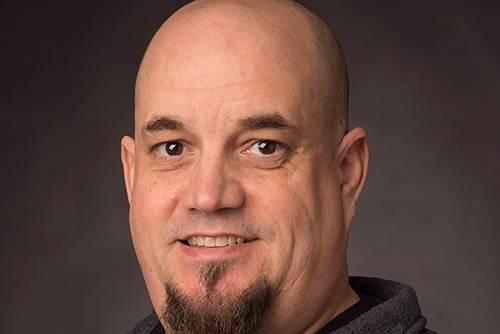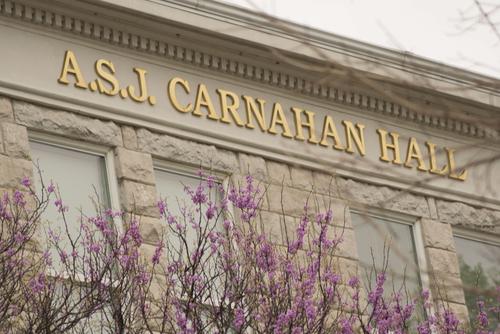M.S. in Criminal Justice
Continue to main content
Criminal Justice by the Numbers
-
$89K
Emergency Management Directors
According to the Bureau of Labor Statistics the median annual salary for emergency management directors is $88,890.
-
$70K
First-Line Supervisors of Correctional Officers
According to the Bureau of Labor Statistics the median annual salary for first-line supervisors of correctional officers is $70,190.
-
$92K
Detectives and Criminal Investigators
According to the Bureau of Labor Statistics the median annual salary for detectives and criminal investigators is $91,610.
Online: Criminal Justice Degree Map
Explore the courses you'll need to complete your degree
Criminal Justice Curriculum
The M.S. in Criminal Justice Program admits students throughout the year with deadlines on April 30 for fall semester, November 21 for spring semester & April 30 for summer semester.
In addition to the criteria established for general admission to graduate studies, applicants must have the following:
-
An undergraduate degree in criminal justice, criminology, or a closely related field prior to enrollment. A student without the necessary undergraduate degree may be required to complete up to 12 hours of background courses in criminal justice prior to taking graduate-level courses. Coursework that must be completed includes Introduction to Criminal Justice, Theories of Crime, Methods of Social Research, and Statistics in Social Research or their equivalent at the undergraduate level. Based on previous undergraduate courses taken, the requirement to take background courses may be waived by either the Director of the Criminal Justice Graduate Program or the Chair of the Department of Criminal Justice, Social Work, and Sociology.
- A minimum undergraduate GPA of 3.0 on a 4.0 scale.
- A minimum graduate GPA of 3.0 on a 4.0 scale (if applicable).
- A letter of intent addressing (a) preparation for graduate study, (b) ability to succeed at the graduate level, (c) explanation of any special circumstances/considerations, and (d) professional goals. The letter should be well written, typed, a maximum of 750 words in length, and addressed to the Director of the Graduate Program in Criminal Justice.
All documents should be submitted directly to the Office of Admissions.
Probationary Admission
Applicants with an undergraduate GPA of 2.50 to 2.99 or a graduate GPA of 2.75 to 2.99 (if applicable) may be admitted on probation with a personal statement outlining an explanation for the lower academic performance and evidence of commitment to graduate education in criminal justice. Applicants must earn a 3.0 GPA in the first 9 hours of graduate-level course work in the core area of study to continue in the program.
Core Requirements
- CJ505 Social Inequality (3)
- CJ520 Law and Social Control (3)
- CJ601 Research Methodology in Criminal Justice (3)*
- CJ615 Theories of Crime (3)*
- CJ626 Statistical Analysis in Criminal Justice (3)*
Choose 15 hours from the following:
- CJ510 Comparative Criminal Justice Systems (3)
- CJ519 Restorative Justice (3)
- CJ522 Critical Analysis of Gangs in America (3)
- CJ525 Crime and Criminal Justice Policy (3)
- CJ540 Ethics in Criminal Justice (3)
- CJ541 Death Penalty in America (3)
- CJ600 The Criminal Justice System (3)
- CJ610 Seminar in Law Enforcement (3)
- CJ625 Adult Correctional Org and Admin (3)
- CJ630 Contemporary Juvenile Justice (3)
- CJ635 Civil Law and Liability (3)
- CJ645 Criminal Justice Policy Analysis and Evaluation (3)
- CJ651 Special Topics in Criminal Justice (3)
- CJ691 Independent Study in Criminal Justice (1)
- CJ692 Independent Study in Criminal Justice (2)
- CJ693 Independent Study in Criminal Justice (3)
- CJ699 Criminal Justice Internship (3-6)
- CJ834 Field Experience in Correctional Institutions (3)
Choose one with the advice of the program coordinator:
- GR698 Master’s Final Comprehensive Examination (0)
- GR699 Master’s Oral Examination (0)
Choose One of the Capstone Options:
Option I - Thesis
- CJ694 Thesis in Criminal Justice (3)
- CJ695 Thesis in Criminal Justice Second Semester (3)
Option 2 - Internship
- CJ696 Internship Capstone I (3)
- CJ697 Internship Capstone II (3)
Option 3 - Leadership
- CJ650 Seminar Criminal Justice Leadership and Practice (3)
Choose one course:
- CJ525 Crime and Criminal Justice Public Policy (3)
- CJ645 Policy Analysis and Evaluation (3)
*Must pass with a grade of B or higher to continue in the program
Adjunct Instructor in the Department of Criminal Justice, Social Work and Sociology
"I believe education is a collaborative effort between the instructor and the student. Each must do their part but it is imperative the instructor give every student the tools they need to succeed. We all have different learning styles so I try to present information in various formats to accommodate each learning style, to ensure every student can be successful. "
Bobby Bollinger, M.S.

College of Humanities and Social Sciences
This degree is housed within the College of Humanities and Social Sciences. The College prepares students for lifelong careers. We boast programs that train students in problem-solving, critical thinking, communication, organization, and adaptability. Skills employers value, so we prepare you for basically any career field.
“ Graduating from the criminal justice program has helped shape me into the state trooper I am today. Even now, coming up on three years as a state trooper, I am constantly going back to my time as a graduate student and dissecting and learning from everyday situations. ”
Online Learning at Southeast
When it comes to your success, we do whatever it takes. Online learning at Southeast takes the same reputable college courses taught by Southeast faculty and makes them available anytime, anywhere.
Earn Your Degree on Your Schedule.
Do more than dream about the future. Take the first steps to make it all happen.
Getting the Job
Your education is just one piece to launching an extraordinary career. Once you’ve mastered the material, you still have to find the job you want, make the right connections, sell your knowledge and experience—and if all this is giving you anxiety, don’t panic. SEMO’s Career Services office is here to help you with the next step. They’ll provide the expertise and support you need, so you’re landing your dream job in no time.
Accelerated Master’s Degree
Southeast offers an accelerated master’s degree for current students. You can get both undergraduate and graduate credit for some 500 level courses, meaning you can graduate with an MBA sooner.
Additional Resources
Cape Girardeau, MO 63701

